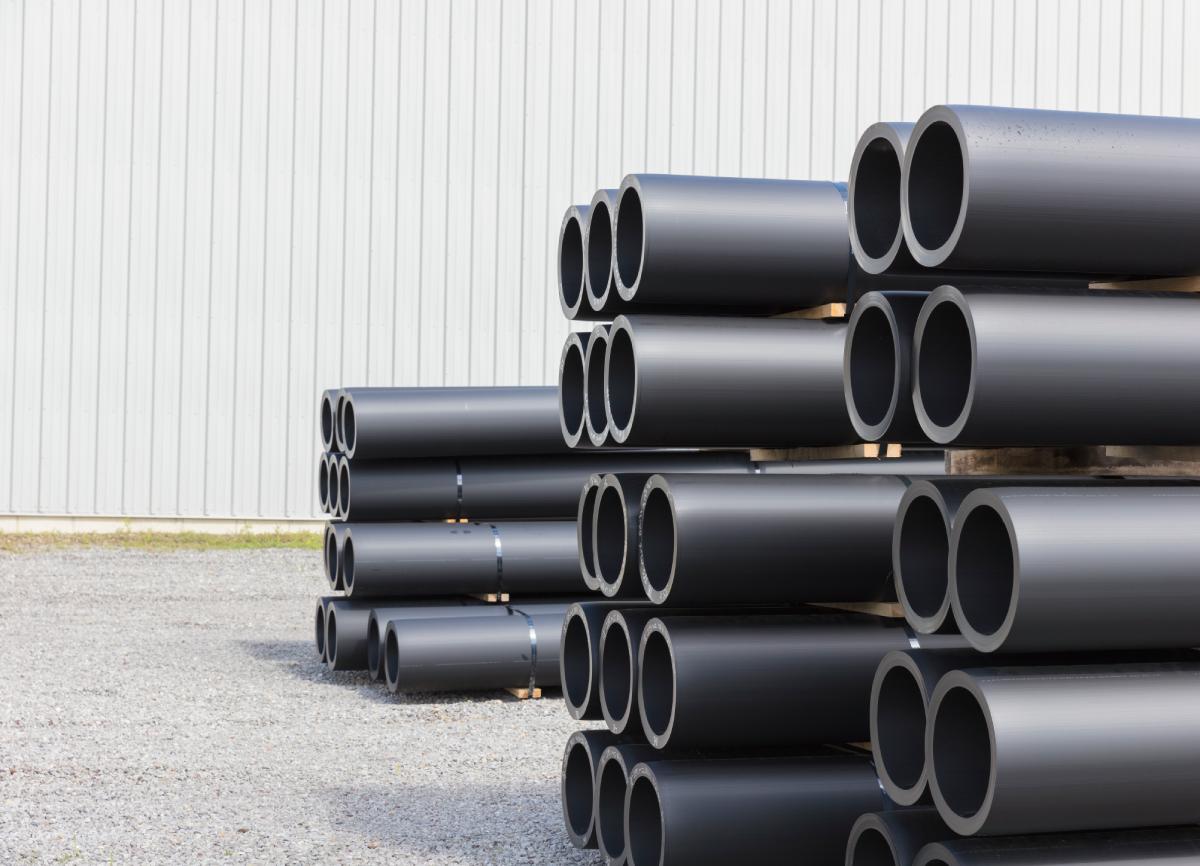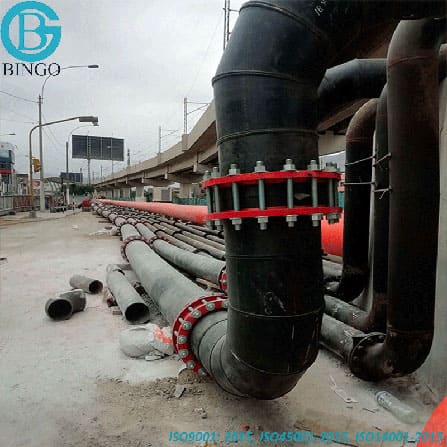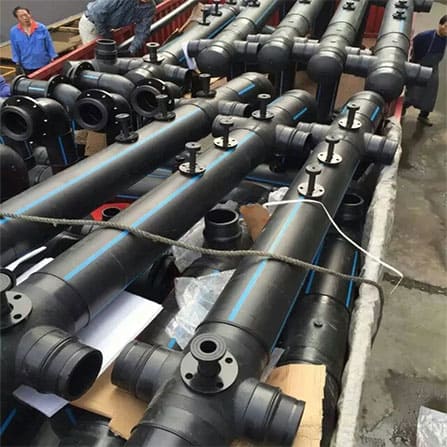The beginner’s guide to sourcing from an HDPE Pipe Supplier
Checking Out the Leading Pipeline Manufacturers: High Quality, Reliability, and Development
The pipeline manufacturing industry stands at the junction of dependability, quality, and innovation, driven by leading firms such as Tenaris and Vallourec. These makers are not just dedicated to generating high-performance products but are likewise introducing lasting techniques that resolve modern ecological issues (Pipeline Manufacturer). As we take a look at the requirements that define excellence in pipeline remedies, it comes to be evident that the landscape is quickly advancing. What certain technologies are arising, and just how are these improvements forming the future of pipeline facilities? The answers may redefine sector standards in ways that are not yet completely comprehended
Leading Manufacturers Review
In the domain name of pipeline manufacturing, numerous essential players arise as leaders, each adding considerably to the sector's landscape. Companies such as Tenaris, Vallourec, and JFE Steel have actually established themselves as frontrunners by regularly delivering top quality items that meet stringent sector requirements. Tenaris, renowned for its cutting-edge remedies, specializes in seamless and welded pipes, catering primarily to the oil and gas field. Vallourec, a French multinational, concentrates on the production of costs tubular services, emphasizing sustainability and advanced technology in its manufacturing procedures.
Likewise, JFE Steel, a significant Japanese manufacturer, is acknowledged for its comprehensive series of steel pipelines, particularly those made use of in energy and infrastructure tasks. Their commitment to research study and development has actually enabled them to produce high-performance products that endure extreme environmental problems. Furthermore, firms like united state Steel and National Oilwell Varco have actually expanded their market visibility by diversifying their product offerings and improving operational performances.
These leading makers not only control the market but likewise drive innovation within the industry, setting criteria for quality and reliability that other gamers aspire to achieve. Their payments are vital for fulfilling the boosting demand for resilient and reliable pipeline solutions worldwide.
Standards for Quality Assessment
Quality analysis in pipeline manufacturing depends upon two important criteria: material sturdiness criteria and making process effectiveness. Making sure that materials fulfill rigorous resilience benchmarks is necessary for the long life and dependability of pipes. Furthermore, maximizing the manufacturing procedure can enhance efficiency while keeping high top quality, ultimately influencing overall efficiency and safety.
Product Toughness Standards
Guaranteeing the long life and dependability of pipeline products is important for maintaining infrastructure stability and functional performance. Material toughness requirements play an important function in examining the top quality of pipes, determining the efficiency and lifespan of the products made use of in building and construction. Manufacturers should adhere to an array of strenuous standards, including those established by companies such as ASTM International and the American Oil Institute (API)
These requirements examine various aspects, including rust resistance, tensile toughness, and fatigue performance. For instance, pipes made use of in destructive atmospheres need materials that can hold up against chemical degradation, while those based on high-pressure conditions need to display remarkable tensile stamina.
Furthermore, aspects such as temperature level variations and environmental problems must be considered, as these can substantially influence material actions with time. Manufacturers commonly use innovative testing methods, including accelerated aging examinations, to imitate long-lasting wear and guarantee that products meet or surpass industry standards.
Manufacturing Process Efficiency
Manufacturers' capacity to enhance making procedure effectiveness is essential for generating premium pipelines that satisfy rigorous industry requirements. Performance in producing straight influences expense administration, manufacturing timelines, and total item stability. To accomplish this, leading pipeline suppliers execute advanced methods such as lean manufacturing, automation, and real-time information analytics.
Lean producing principles are important in lessening waste and making best use of resource use. By enhancing procedures and getting rid of redundancies, manufacturers can enhance productivity while guaranteeing consistent quality. Automation modern technologies, consisting of robotics and computer system numerical control (CNC) machines, play a pivotal duty in boosting precision and minimizing human error, consequently raising the integrity of the end product.
In addition, the use of real-time data analytics permits makers to keep track of manufacturing procedures constantly, allowing them to recognize traffic jams and make timely modifications. This positive technique not only enhances efficiency yet also supports top quality assurance methods by ensuring compliance with regulatory criteria.
Reliability in Pipeline Solutions
Dependability in pipeline services is critical, as it straight influences the safety and effectiveness of fluid transportation systems. Trick elements consist of the resilience of materials used, adherence to strenuous testing and qualification requirements, and the incorporation of ingenious product options that improve efficiency. Comprehending these elements is important for makers aiming to deliver reliable pipeline facilities.
Relevance of Sturdiness
Achieving toughness in pipeline services is important, as it directly influences the long-lasting performance and security of facilities. Long lasting pipes are vital for decreasing maintenance expenses and lowering the probability of tragic failures. This dependability is specifically crucial in markets such as oil and gas, water system, and wastewater management, where the repercussions of pipeline failing can be serious, both economically and environmentally.
The products and making procedures employed by pipeline makers play a substantial duty in determining the toughness of the end product. Utilizing high-quality basic materials, progressed innovations, and cutting-edge design principles ensures that pipes can endure various stressors, consisting of pressure changes, temperature level variations, and harsh settings.
In addition, the toughness of pipelines is very closely connected to their ability to stand up to exterior elements such as soil motion, seismic activity, and chemical direct exposures. Reliable deterioration security approaches, such as layers and cathodic security, even more boost the longevity of pipes, guarding them versus wear and tear over time.
Buying durable pipeline solutions eventually equates to enhanced functional efficiency, decreased downtime, and improved safety, affirming the important significance of sturdiness in modern pipeline manufacturing.
Evaluating and Certification Requirements
In the domain name of pipeline services, rigorous testing and certification criteria are crucial to assure the dependability and security of framework. These standards act as benchmarks for reviewing the performance and sturdiness of pipeline materials and systems, confirming they satisfy certain regulative and market requirements.
Testing procedures normally incorporate numerous methods, including pressure screening, hydrostatic examinations, and non-destructive testing methods. These assessments are essential for recognizing potential weaknesses or defects in the products prior to they are released in real-world applications. Furthermore, Continue certification by identified companies warranties that manufacturers abide by developed guidelines, which promotes count on among stakeholders, including contractors, engineers, and end-users.
Many prominent pipeline suppliers take part in continual surveillance and enhancement of their testing protocols to adjust to evolving market standards and technological advancements. Compliance with requirements such as ASTM, ASME, and ISO not just boosts product integrity but additionally minimizes the threat of ecological incidents connected with pipeline failings.
Cutting-edge Material Solutions
The advancement of innovative product remedies has actually changed the landscape of pipeline manufacturing, boosting both performance and sturdiness. Advanced materials such as high-density polyethylene (HDPE), cross-linked polyethylene (PEX), and composite materials have actually arised as game-changers, supplying exceptional resistance to deterioration, temperature variations, and stress variants. These materials not just extend the life expectancy of pipes yet likewise lower upkeep expenses, making sure reliable lasting performance.
Manufacturers are progressively taking on clever products that include sensors for real-time surveillance. This technology enables aggressive upkeep, considerably improving reliability by detecting leaks or architectural weaknesses before they escalate right into crucial failings. The combination of nanotechnology has additionally resulted in the development of finishings that improve the toughness of pipelines against abrasion and chemical exposure.
Sustainability is one more key emphasis, with makers exploring bio-based composites and recyclable products that minimize ecological influence. As regulative requirements remain to evolve, the emphasis on ingenious material remedies comes to be vital in conference stringent safety and environmental requirements. Ultimately, these advancements not only boost the reliability of pipeline systems however likewise contribute to the overall effectiveness and sustainability of power transport frameworks.
Innovations in Pipeline Modern Technology
Innovations in pipeline innovation are revolutionizing the industry by boosting performance, safety and security, and ecological sustainability. Recent innovations focus on wise pipeline systems that make use of sensing units and IoT innovation to check conditions in actual time, allowing aggressive upkeep and minimizing the danger of failures. These systems can discover leaks, stress adjustments, and various other abnormalities, enabling fast reaction and decreasing environmental influence.
In addition, the development of advanced materials, such as composite and corrosion-resistant alloys, substantially extends the lifespan and dependability of pipelines. HDPE Pipe Supplier (American Plastics LLC HDPE Pipeline Manufacturer). These products reduce maintenance costs and enhance efficiency in extreme environments, making them suitable for gas, water, and oil transportation
Automation and robotics are playing a crucial function in pipeline building and construction and evaluation. Drones and robot gadgets help with surveys and evaluations of hard-to-reach locations, ensuring extensive examinations without compromising security.
Additionally, ingenious styles, such as modular pipeline systems, enable greater adaptability in installation and alteration, catering to the vibrant requirements of the power field. With each other, these technical innovations not only enhance operational efficiency but additionally add to an extra lasting and resistant pipeline framework, leading the way for a greener future.
Study of Success
Throughout numerous industries, effective applications of advanced pipeline innovations show substantial enhancements in operational efficiency and safety and security. One noteworthy instance is the deployment of wise pipeline monitoring systems in the oil and gas sector, where real-time information analytics have decreased leak discovery times by over 50%. This not just decreases ecological risks but likewise improves the overall integrity of pipeline facilities.

Furthermore, a major manufacturer implemented robot evaluation innovations in its pipeline maintenance operations, resulting in a 40% enhancement in examination efficiency. This approach has structured upkeep routines and substantially decreased downtime.
These situation research studies highlight exactly how prominent pipeline suppliers are leveraging advanced technologies to foster integrity and operational excellence, eventually establishing brand-new standards for the market. As these successes proceed to unfold, they pave the method for additional advancements in pipeline manufacturing and administration.

Environmental Sustainability Practices
Often, pipeline makers are focusing on environmental sustainability techniques to reduce their eco-friendly impact and boost the longevity of their items. This commitment is reflected in numerous initiatives targeted at reducing waste, saving energy, and using lasting products throughout the manufacturing procedure.

Lots of manufacturers are adopting sophisticated technologies that minimize discharges and energy intake. The combination of automated systems and energy-efficient equipment helps simplify manufacturing while reducing reliance on fossil gas. Additionally, firms are significantly turning to green products, such as recycled metals and bioplastics, which not only decrease the ecological impact however also advertise a circular economic situation.
Additionally, pipeline makers are implementing extensive lifecycle evaluations to evaluate the ecological implications of their items from creation to disposal. This strategy allows them to determine chances for improvement and foster liable sourcing and waste administration techniques.
Partnership with environmental organizations further enhances these efforts, as manufacturers look for to align their operations with worldwide sustainability goals. Ultimately, these ecological sustainability techniques not only add to a healthier earth but also setting suppliers as responsible leaders in the industry, attracting environmentally conscious stakeholders and consumers alike.
Future Fads in Pipeline Manufacturing
As the need for a lot more effective and lasting framework grows, pipeline manufacturing is poised for significant developments that will reshape the market. Secret trends expected in the coming years include the integration of advanced materials, such as composite and corrosion-resistant alloys, which improve durability while decreasing ecological impact. Manufacturers are also expected to take on cutting-edge manufacturing methods, like additive manufacturing and automation, to streamline procedures, minimize waste, and lower prices.
The surge of wise pipeline technologies, incorporating sensors and IoT tools, will certainly make it possible for real-time monitoring and anticipating maintenance, thus improving safety and operational performance. This digital improvement will not just maximize source monitoring however also help with conformity with stringent ecological guidelines.
Sustainability will certainly stay a central emphasis, driving suppliers to buy green techniques, consisting of energy-efficient production techniques and reusing campaigns. As the international emphasis on climate adjustment increases, pipeline producers will require to adapt by developing solutions that satisfy both ecological and financial needs.
Regularly Asked Inquiries

What Industries Mostly Make Use Of Pipeline Products From These Manufacturers?
Pipeline items are largely utilized in markets such as oil and water, gas and wastewater management, chemical handling, mining, and construction. These markets rely on reliable, resilient, and secure transportation of products and liquids.
Exactly How Do Manufacturers Make Certain Conformity With International Pipeline Criteria?
Manufacturers assure conformity with global pipeline standards by executing rigorous quality assurance processes, carrying out regular evaluations, sticking to well-known regulatory frameworks, and purchasing staff member training to advertise recognition and understanding of security and top quality demands.
What Is the Ordinary Lifespan of Pipelines From Leading Manufacturers?
The ordinary lifespan of pipelines from leading producers generally varies from 30 to 100 years, depending upon product, ecological conditions, and maintenance techniques. American Plastics LLC HDPE Pipeline Manufacturer. Regular examinations and adherence to market requirements considerably affect durability and performance
Exist Certifications Particular to Pipeline Manufacturing High Quality?
Yes, various accreditations exist for pipeline manufacturing high quality, consisting of ISO 9001 for high quality management systems and API requirements particular to pipelines. These qualifications guarantee adherence to extensive safety and security, performance, and ecological requirements within the market.
Exactly How Do Manufacturers Take Care Of Pipeline Upkeep and Fixes?
Manufacturers typically carry out a proactive upkeep technique that includes routine inspections, monitoring systems for very early discovery of concerns, and a structured repair procedure. This method guarantees pipeline stability, minimizes downtime, and boosts total functional efficiency.
Quality assessment in pipeline manufacturing pivots on 2 vital criteria: material resilience standards and producing procedure efficiency - Pipeline Manufacturer. Product durability criteria play an important role in reviewing the quality of pipes, determining the performance and lifespan of the products made use of in construction. The products and producing procedures employed by pipeline makers play a significant function in identifying the sturdiness of the final item. The ordinary life-span of pipes from leading makers normally varies from 30 to 100 years, depending on product, ecological conditions, and upkeep techniques. Yes, various certifications exist for pipeline manufacturing quality, consisting of ISO 9001 for high quality monitoring systems and API requirements specific to pipelines